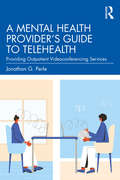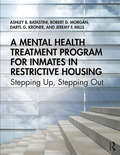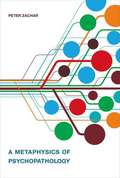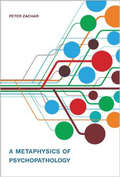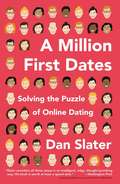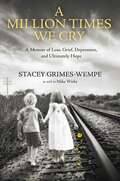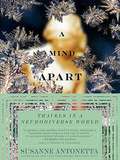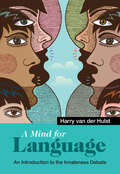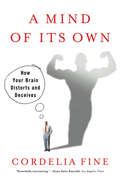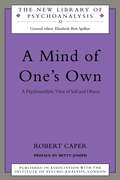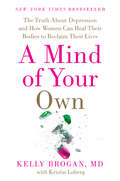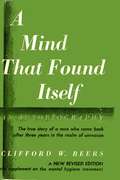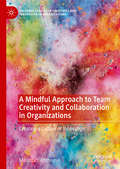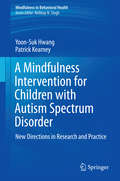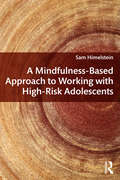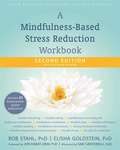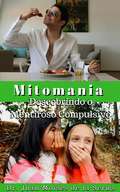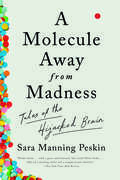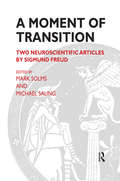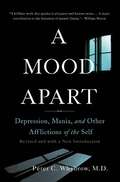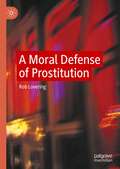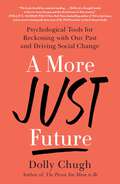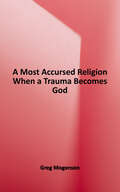- Table View
- List View
A Mental Health Provider's Guide to Telehealth: Providing Outpatient Videoconferencing Services
by Jonathan G. PerleThis book works as a guide to videoconferencing practice for psychological providers through a broad, simplified, and practical overview of pertinent factors. It is a consolidation of research literature and professional experiences of practicing, teaching, and studying videoconferencing. It begins by defining key concepts such as telehealth, telepsychology, and other related terminology and examining the role of telehealth in addressing ongoing mental health disparities. An overview of existing videoconferencing practices, guidebooks and general recommendations, as well as specifics of ethical and legal factors are discussed. The book then details numerous essential factors of videoconferencing practice that are directly applicable to psychological care, including considerations of computer system, video camera, display screen, microphone, videoconferencing platform, bandwidth and latency, and room setup, along with self-care practices. The appendices provide readers with links to resources, checklists, and other documents to guide their practice. Psychologists, counselors, and other mental health providers will find this user-friendly, research-informed guide indispensable when implementing online treatment and teletherapy.
A Mental Health Treatment Program for Inmates in Restrictive Housing: Stepping Up, Stepping Out
by Robert D. Morgan Jeremy F. Mills Ashley B. Batastini Daryl G. KronerThis treatment program targets the criminal, behavioral, and mental health problems of inmates in segregated housing that prevents them from living prosocially and productively within the general prison population. The program makes use of a bi-adaptive psychoeducational and cognitive-behavioral treatment model to increase inmates’ understanding about the psychological and criminal antecedents that contributed to their current placement, and to teach them the skills necessary for managing these problem areas. This flexible intervention assists inmates with significant problem behaviors by reducing psychological impairment and improving their ability to cope with prison life. This book includes a program introduction and guide for clinicians, the inmate workbook, and accompanying eResources to assist clinicians in both successful program implementation and evaluation of treatment outcomes. Designed to account for the safety and physical limitations that make the delivery of needed mental and behavioral health services difficult, this guide is essential reading for practitioners working with high-needs, high-risk inmate populations.
A Metaphysics of Psychopathology
by Peter ZacharIn psychiatry, few question the legitimacy of asking whether a given psychiatric disorder is real; similarly, in psychology, scholars debate the reality of such theoretical entities as general intelligence, superegos, and personality traits. And yet in both disciplines, little thought is given to what is meant by the rather abstract philosophical concept of "real." Indeed, certain psychiatric disorders have passed from real to imaginary (as in the case of multiple personality disorder) and from imaginary to real (as in the case of post-traumatic stress disorder). In this book, Peter Zachar considers such terms as "real" and "reality" -- invoked in psychiatry but often obscure and remote from their instances -- as abstract philosophical concepts. He then examines the implications of his approach for psychiatric classification and psychopathology. Proposing what he calls a scientifically inspired pragmatism, Zachar considers such topics as the essentialist bias, diagnostic literalism, and the concepts of natural kind and social construct. Turning explicitly to psychiatric topics, he proposes a new model for the domain of psychiatric disorders, the imperfect community model, which avoids both relativism and essentialism. He uses this model to understand such recent controversies as the attempt to eliminate narcissistic personality disorder from the DSM-5. Returning to such concepts as real, true, and objective, Zachar argues that not only should we use these metaphysical concepts to think philosophically about other concepts, we should think philosophically about them.
A Metaphysics of Psychopathology (Philosophical Psychopathology)
by Peter ZacharAn exploration of what it means to think about psychiatric disorders as “real,” “true,” and “objective” and the implications for classification and diagnosis.In psychiatry, few question the legitimacy of asking whether a given psychiatric disorder is real; similarly, in psychology, scholars debate the reality of such theoretical entities as general intelligence, superegos, and personality traits. And yet in both disciplines, little thought is given to what is meant by the rather abstract philosophical concept of “real.” Indeed, certain psychiatric disorders have passed from real to imaginary (as in the case of multiple personality disorder) and from imaginary to real (as in the case of post-traumatic stress disorder). In this book, Peter Zachar considers such terms as “real” and “reality”—invoked in psychiatry but often obscure and remote from their instances—as abstract philosophical concepts. He then examines the implications of his approach for psychiatric classification and psychopathology.Proposing what he calls a scientifically inspired pragmatism, Zachar considers such topics as the essentialist bias, diagnostic literalism, and the concepts of natural kind and social construct. Turning explicitly to psychiatric topics, he proposes a new model for the domain of psychiatric disorders, the imperfect community model, which avoids both relativism and essentialism. He uses this model to understand such recent controversies as the attempt to eliminate narcissistic personality disorder from the DSM-5. Returning to such concepts as real, true, and objective, Zachar argues that not only should we use these metaphysical concepts to think philosophically about other concepts, we should think philosophically about them.
A Million First Dates
by Dan Slater** Previously published in hardcover as Love in the Time of Algorithms ** Once considered the realm of the lonely and desperate, sites like eHarmony, Match, OkCupid, and Plenty of Fish have been embraced by pretty much every demographic. Dating has been transformed from a daunting transaction based on scarcity to one in which the possibilities are almost endless. Now anyone can search for exactly what they want, connect with more people, and get more information about those people than ever before. As journalist Dan Slater shows, online dating is changing society in more profound ways than we imagine. He explores how these new technologies, by altering our perception of what's possible, are reconditioning our feelings about commitment and challenging the traditional paradigm of adult life. Slater takes readers behind the scenes of a fascinating business. Dating sites capitalize on our quest for love, but how do their creators' ideas about pro ts, morality, and the nature of desire shape the virtual worlds they've created for us?
A Million Times We Cry: A Memoir of Loss, Grief, Depression, and Ultimately Hope
by Stacey Grimes-WempeThe day after she and her husband moved into their first home, Stacey Wempe&’s simple, ideal life in Saskatchewan was shattered. At daybreak, her aunt and uncle arrived at her new home to tell her that her twenty-two-year-old brother, Clinton, had been killed in a tragic accident a few hours earlier. Driving in thick fog to rescue his stranded girlfriend, he drove his truck into the side of a freight train traveling on a rarely used track. This random, tragic event propelled Stacey into a downward spiral of depression and anxiety that lasted years. Prolonged grief extended to postpartum depression after the birth of her son and daughter. Her despair led to marital stress, intensified by her mother and father losing their battles with cancer. In the face of overwhelming sorrow, she struggled to move on but knew she had no alternative. A Million Times We Cry is Stacey&’s uplifting story of her fight to regain control of her life, find hope and joy, and move past her anguish. Seeking therapeutic intervention and subsequently displaying bravery and persistence, she embarked on a journey to become a Fearless Living life coach. Ultimately, Stacey confronted the very things she had evaded—her fears, anguish, and insecurities—and embraced herself and her existence. Drawing upon her life's lessons and life-coach training, Stacey reveals her raw and poignant emotional healing journey that led to a life filled with hope and happiness. Her concluding insights into how others can start their journey to discover healing, hope, and joy are profoundly inspiring.
A Mind Apart
by Susanne AntonettaThis beautifully written exploration of "the unusual abilities of those who are differently wired" (Psychology Today) received a Ken Book Award from the National Alliance on Mental Illness for outstanding literary contribution to the world of mental health. In this fascinating literary memoir, Susanne Antonetta draws on her personal experience as a manic-depressive, as well as interviews with people with multiple personality disorder, autism, and other neurological conditions, to form an intimate meditation on mental "disease. " She traces the many capabilities-the visual consciousness of an autistic, for example, or the metaphoric consciousness of a manic-depressive-that underlie these and other mental "disabilities. " A stunning portrait of how the world shapes itself in minds that are profoundly different from the norm, A Mind Apart urges readers to look beyond the concept of cures to the gifts inherent in many neuroatypical conditions. Employing a wide-ranging approach to her subject, Antonetta provides a rare glimpse into the wildly varying landscapes of human thought, perception, and emotion. .
A Mind of Its Own: How Your Brain Distorts and Deceives
by Cordelia Fine"Provocative enough to make you start questioning your each and every action."--Entertainment Weekly The brain's power is confirmed and touted every day in new studies and research. And yet we tend to take our brains for granted, without suspecting that those masses of hard-working neurons might not always be working for us. Cordelia Fine introduces us to a brain we might not want to meet, a brain with a mind of its own. She illustrates the brain's tendency toward self-delusion as she explores how the mind defends and glorifies the ego by twisting and warping our perceptions. Our brains employ a slew of inborn mind-bugs and prejudices, from hindsight bias to unrealistic optimism, from moral excuse-making to wishful thinking--all designed to prevent us from seeing the truth about the world and the people around us, and about ourselves.
A Mind of One's Own: A Psychoanalytic View of Self and Object (The New Library of Psychoanalysis)
by Robert A. CaperThis collection of papers, written over the last six years by Robert Caper, focuses on the importance of distinguishing self from object in psychological development. Robert Caper demonstrates the importance this psychological disentanglement plays in the therapeutic effect of psychoanalysis. In doing so he demonstrates what differentiates the practice of psychoanalysis from psychotherapy; while psychotherapy aims to ease the patient towards "good mental health" through careful suggestion; psychoanalysis allows the patient to discover him/herself, with the self wholly distinguished from other people and other objects.
A Mind of One's Own: A Psychoanalytic View of Self and Object (The New Library of Psychoanalysis)
by Robert A. CaperThis collection of papers, written over the last six years by Robert Caper, focuses on the importance of distinguishing self from object in psychological development.Robert Caper demonstrates the importance this psychological disentanglement plays in the therapeutic effect of psychoanalysis.In doing so he demonstrates what differentiates the practice of psychoanalysis from psychotherapy; while psychotherapy aims to ease the patient towards "good mental health" through careful suggestion; psychoanalysis allows the patient to discover him/herself, with the self wholly distinguished from other people and other objects.
A Mind of Your Own: The Truth About Depression and How Women Can Heal Their Bodies to Reclaim Their Lives
by Kristin Loberg Kelly BroganNamed one of the top health and wellness books for 2016 by MindBodyGreenDepression is not a disease. It is a symptom.Recent years have seen a shocking increase in antidepressant use the world over, with 1 in 4 women starting their day with medication. These drugs have steadily become the panacea for everything from grief, irritability, panic attacks, to insomnia, PMS, and stress. But the truth is, what women really need can't be found at a pharmacy.According to Dr. Kelly Brogan, antidepressants not only overpromise and underdeliver, but their use may permanently disable the body's self-healing potential. We need a new paradigm: The best way to heal the mind is to heal the whole body.In this groundbreaking, science-based and holistic approach, Dr. Brogan shatters the mythology conventional medicine has built around the causes and treatment of depression. Based on her expert interpretation of published medical findings, combined with years of experience from her clinical practice, Dr. Brogan illuminates the true cause of depression: it is not simply a chemical imbalance, but a lifestyle crisis that demands a reset. It is a signal that the interconnected systems in the body are out of balance - from blood sugar, to gut health, to thyroid function- and inflammation is at the root.A Mind of Your Own offers an achievable, step-by-step 30-day action plan--including powerful dietary interventions, targeted nutrient support, detoxification, sleep, and stress reframing techniques--women can use to heal their bodies, alleviate inflammation, and feel like themselves again without a single prescription.Bold, brave, and revolutionary, A Mind of Your Own takes readers on a journey of self-empowerment for radical transformation that goes far beyond symptom relief.
A Mind that Found Itself: An Autobiography (classic Reprint)
by Clifford Whittingham BeersA Mind That Found Itself by Clifford Whittingham Beers, is derived from as human a document as ever existed; and, because of its uncommon nature, perhaps no one thing contributes so much to its value as its authenticity. It is an autobiography, and more: in part it is a biography; for, in telling the story of the authors life, which he must relate the history of another self-a self which was dominant from his twenty-fourth to twenty-sixth year. During that period, unlike he had ever been been, or what he has been since. The biographical part of his autobiography might be called the history of a mental civil war, which he fought single-handed on a battlefield that lay within the compass of his skull.
A Mindful Approach to Team Creativity and Collaboration in Organizations: Creating a Culture of Innovation (Palgrave Studies in Creativity and Innovation in Organizations)
by Melinda J. RothouseThis book examines how contemplative arts practice and a mindful approach to creativity, can be used to offer new possibilities for facilitating team creativity and collaboration in organizational settings. The author employs a qualitative, action research paradigm, using arts‐based and ethnographic methods, to explore the perceived effects of a contemplative arts workshop process on team creativity and collaboration within an organization. The book demonstrates how a contemplative arts workshop process may be used to facilitate mindfulness, trust, communication, collaboration, and creative insights among teams and working groups. It explores each of these themes in depth and develops a model based on those findings. The model includes five elements: 1. Individual-Level Mindfulness, 2. Trust and Authentic Communication, 3. Team Cohesion and Collaboration, 4. Creative Ideation and Insights, and 5. Leadership: Creating a Culture of Innovation. Combining theory and practice, the book offers a series of mindfulness and contemplative arts exercises that facilitators can use to address each of the five levels of the model. This book weaves together contemporary psychological research on mindfulness and organizational creativity along with practical applications and contemplative arts exercises for practitioners and scholars of workplace creativity, management and organisational and industrial psychology.
A Mindfulness Intervention for Children with Autism Spectrum Disorders: New Directions in Research and Practice (Mindfulness in Behavioral Health)
by Yoon-Suk Hwang Patrick KearneyThis book presents emerging research on the effectiveness of mindfulness methods in reducing behavior problems associated with autism spectrum disorders (ASD) in children. The volume synthesizes current research and theories on the therapeutic uses of mindfulness, specifically for people living with developmental disabilities. In addition, it examines a promising new study in which mothers of children with ASD learn mindfulness techniques for their own use and are then trained to teach the methods to their children. The book concludes with a report of poststudy findings and a discussion of practical and methodological issues regarding mindfulness interventions for ASD. Featured topics include: A genealogy of mindfulness, from original Buddhist texts to modern health applications. Implications for further research and advancement. Appendices of basic mindfulness exercises and activities. A Mindfulness Intervention for Children with Autism Spectrum Disorders is a concise resource for researchers, clinicians and other scientist-practitioners, and graduate students in developmental psychology, social work, education, and related disciplines.
A Mindfulness-Based Approach to Working with High-Risk Adolescents
by Sam HimelsteinA Mindfulness-Based Approach to Working With High-Risk Adolescents is an accessible introduction to a new model of therapy that combines the Buddhist concept of mindfulness with modern trends in psychotherapy. Drawing on years of experience working with at-risk adolescents, the chapters explore ways to develop authentic connections with patients: building relationships, working with resistance, and ways to approach change using mindfulness-based techniques. Real-life interactions and illustrations are used to show how a mindfulness-oriented therapist can approach working with adolescents in individual and group settings, and the book also provides practical suggestions designed for immediate implementation. A Mindfulness-Based Approach to Working With High-Risk Adolescents is a must for any mental health professional interested in using mindfulness and other contemplative practices with at-risk youth.
A Mindfulness-Based Stress Reduction Workbook
by Elisha Goldstein Bob StahlStress and pain are nearly unavoidable in our daily lives; they are part of the human condition. This stress can often leave us feeling irritable, tense, overwhelmed, and burned-out. The key to maintaining balance is responding to stress not with frustration and self-criticism, but with mindful, nonjudgmental awareness of our bodies and minds. Impossible? Actually, it's easier than it seems. <p><p> In just weeks, you can learn mindfulness-based stress reduction (MBSR), a clinically proven program developed by Jon Kabat-Zinn, author of Full Catastrophe Living. MBSR is effective in alleviating stress, anxiety, panic, depression, chronic pain, and a wide range of medical conditions. Taught in classes and clinics worldwide, this powerful approach shows you how to focus on the present moment and permanently change the way you handle stress. <p><p> As you work through this Workbook, you'll learn how to replace stress-promoting habits with mindful ones-a skill that will last a lifetime. This groundbreaking, proven-effective program will help you relieve the symptoms of stress and identify its causes. This fully revised and updated second edition includes new audio downloads, new meditations, and extensive chapter revisions to help you manage stress and start living a healthier, happier life.
A Mitomania - Descobrindo o Mentiroso Compulsivo
by Juan Moises de la Serna Victor PereiraÀs vezes na vida nos encontramos com pessoas que nos dizem algo que logo se vê que não é verdade, isso pode ser que não passe de uma história; mas quando as mentiras são constantes, pode ser que estejamos diante de um mitômano, ou seja, uma pessoa que mente quase compulsivamente, também conhecido como mentiroso patológico. Com este texto você aprenderá o que significa, como diferenciá-lo de outros casos que mostram sintomas parecidos de mentiras e como tratar este problema.
A Molecule Away from Madness: Tales Of The Hijacked Brain
by Sara Manning PeskinLonglisted for the PEN/E.O. Wilson Literary Science Writing Award Riveting stories of the brain on the brink, from an acclaimed cognitive neurologist. Our brains are the most complex machines known to humankind, but they have an Achilles heel: the very molecules that allow us to exist can also sabotage our minds. Here are gripping accounts of unruly molecules and the diseases that form in their wake. A college student cannot remember if she has eaten breakfast. By dinner, she is strapped to a hospital bed, convinced she is battling zombies. A man planning to propose marriage instead becomes violently enraged, gripped by body spasms so severe that he nearly bites off his own tongue. One after another, poor farmers in South Carolina drop dead from a mysterious epidemic of dementia. With an intoxicating blend of history and intrigue, Sara Manning Peskin invites readers to play medical detective, tracing each diagnosis from the patient to an ailing nervous system. Along the way, Peskin entertains with tales of the sometimes outlandish, often criticized, and forever devoted scientists who discovered it all. Peskin never loses sight of the human impact of these conditions. Alzheimer’s Disease is more than the gradual loss of a loved one; it can be a family’s multigenerational curse. The proteins that abound in every cell of our bodies are not simply strings of oxygen, hydrogen, nitrogen, and carbon; they are the building blocks of our personalities and relationships. A Molecule Away from Madness is an unputdownable journey into the deepest mysteries of our brains.
A Moment of Transition: Two Neuroscientific Articles by Sigmund Freud
by Mark Solms Michael SalingTranslations of two neuroscientific articles by Freud are presented here for the first time in English. Alongside these, the editors offer convincing arguments for their importance to both psychoanalysis and neuroscience. These articles helped provide the catalyst for the modern activity in the field, and will prove fascinating to anyone interested in the origins of this bold new movement. Between 1877 and 1900, Sigmund Freud published over one hundred neuroscientific works, only seven of which have previously appeared in English translation. Aphasie and Gehirn, the two articles presented in A Moment of Transition, were originally composed in 1888 as dictionary entries for the Handwortebuch der gesamten Medizin edited by Albert Villaret. They therefore date from a pivotal period of Freud's career when a growing interest in psychology had already begun to vie with strictly neurological endeavors; a shift of emphasis reflected in the novel and independent conceptual position adopted in both papers, prefiguring Freud's later work On Aphasia and certain aspects of the Project for a Scientific Psychology.
A Mood Apart: Depression, Mania, and Other Afflictions of the Self
by Peter C. WhybrowWhen first published in 1997 this groundbreaking work on the science of mood both redefined the field and--with compassion, understanding, and scientific rigor--made it accessible to those who would most benefit from the latest findings. Now, Peter Whybrow, one of the world’s most distinguished psychiatrists, has updated his definitive account of mood disorders. In A Mood Apart he argues that disorders such as depression constitute afflictions of the self, exploring the human experience of manic depressive illness, and rediscovering the human being behind the diagnosis. Drawing on cutting-edge research and his experience as a clinician, he shows how the science and culture surrounding mood disorders have changed since the first edition. Nearly two decades since its original publication, A Mood Apart remains an essential book for anyone who has been affected by depression.
A Moral Defense of Prostitution
by Rob LoveringIs prostitution immoral? In this book, Rob Lovering argues that it is not. Offering a careful and thorough critique of the many—twenty, to be exact—arguments for prostitution's immorality, Lovering leaves no claim unchallenged. Drawing on the relevant literature along with his own creative thinking, Lovering offers a clear and reasoned moral defense of the world's oldest profession. Lovering demonstrates convincingly, on both consequentialist and nonconsequentialist grounds, that there is nothing immoral about prostitution between consenting adults. The legal implications of this view are also brought to bear on the current discourse surrounding this controversial topic.
A Moral Theory of Political Reconciliation
by Colleen MurphyFollowing extended periods of conflict or repression, political reconciliation is indispensable to the establishment or restoration of democratic relationships and critical to the pursuit of peacemaking globally. In this important new book, Colleen Murphy offers an innovative analysis of the moral problems plaguing political relationships under the strain of civil conflict and repression. Focusing on the unique moral damage that attends the deterioration of political relationships, Murphy identifies the precise kinds of repair and transformation that processes of political reconciliation ought to promote. Building on this analysis, she proposes a normative model of political relationships. A Moral Theory of Political Reconciliation delivers an original account of the failure and restoration of political relationships, which will be of interest to philosophers, social scientists, legal scholars, policy analysts, and all those who are interested in transitional justice, global politics, and democracy.
A More Just Future: Psychological Tools for Reckoning with Our Past and Driving Social Change
by Dolly ChughWinner of the 2024 Getting To We Words Create Worlds Award In the vein of Think Again and Do Better, a revolutionary, &“welcome, and urgent invitation&” (Angela Duckworth, #1 New York Times bestselling author) to explore the emotional relationship we have with our country&’s complicated and whitewashed history so that we can build a better future. As we grapple with news stories about our country&’s racial fault lines, our challenge is not just to learn about the past, but also to cope with the &“belief grief&” that unlearning requires. If you are on the emotional journey of reckoning with the past, such as the massacre of Black Americans in Tulsa, the killing of Native American children in compulsory &“residential schools&” designed to destroy their culture, and the incarceration of Japanese Americans, you are not alone. The seeds of today&’s inequalities were sown in past events like these. The time to unlearn the whitewashed history we believed was true is now. As historians share these truths, we will need psychologists to help us navigate the shame, guilt, disbelief, and despair many of us feel. In A More Just Future, Dolly Chugh, award-winning professor, social psychologist, and author of the acclaimed The Person You Mean to Be, invites us to dismantle the systems built by our forebearers and work toward a more just future. Through heartrending personal histories and practical advice, Chugh gives us the psychological tools we need to grapple with the truth of our country with &“one of the most moving and important behavioral science books of the last decade&” (Katy Milkman, author of How to Change).
A Most Accursed Religion: When a Trauma Becomes God
by Greg Mogenson"Despite its title, this book is not about theology. When a psychologist writes of God, he must do so within the confines of his own field of inquiry, the psyche. Mogenson's aim is to focus attention on the religious dimension of the psychology of those overwhelming events we describe as traumatic"--Provided by publisher.
